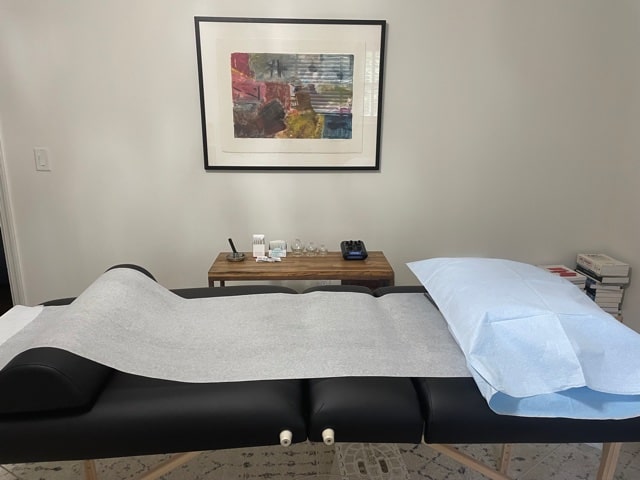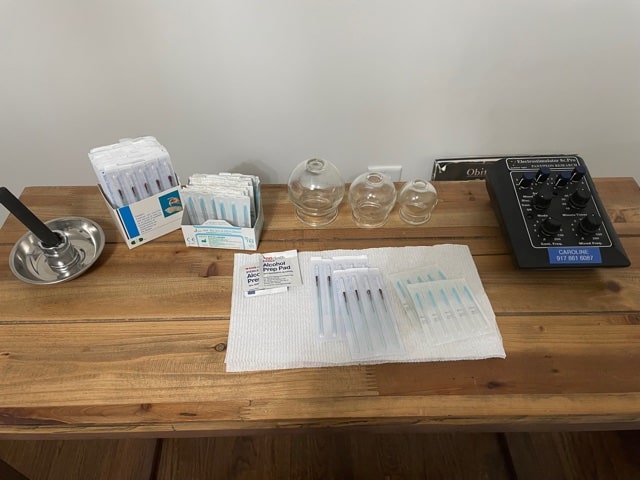Salary, Job Description, How To Become One, and Quiz
.jpg)
Acupuncturists
Acupuncturists provide treatment of symptoms and disorders using needles and small electrical currents. May provide massage treatment. May also provide preventive treatments.
Table of contents
What they do
Acupuncturists provide treatment of symptoms and disorders using needles and small electrical currents. May provide massage treatment. May also provide preventive treatments.
- Insert needles to provide acupuncture treatment.
- Maintain and follow standard quality, safety, environmental and infection control policies and procedures.
- Adhere to local, state and federal laws, regulations and statutes.
- Identify correct anatomical and proportional point locations based on patients’ anatomy and positions, contraindications, and precautions related to treatments such as intradermal needles, moxibution, electricity, guasha, or bleeding.
Typical day
On a daily basis, Acupuncturists insert needles to provide acupuncture treatment. They maintain detailed and complete records of health care plans and prognoses.
A typical day for an Acupuncturist will also include:
- Identify correct anatomical and proportional point locations based on patients’ anatomy and positions, contraindications, and precautions related to treatments such as intradermal needles, moxibution, electricity, guasha, or bleeding.
- Maintain and follow standard quality, safety, environmental and infection control policies and procedures.
- Adhere to local, state and federal laws, regulations and statutes.
- Analyze physical findings and medical histories to make diagnoses according to Oriental medicine traditions.
- Develop individual treatment plans and strategies.
Other responsibilities
Besides their typical day, Acupuncturists also formulate herbal preparations to treat conditions considering herbal properties such as taste, toxicity, effects of preparation, contraindications, and incompatibilities. They may also apply moxibustion directly or indirectly to patients using Chinese, non-scarring, stick, or pole moxa.
On a weekly to monthly basis, Acupuncturists consider western medical procedures in health assessment, health care team communication, and care referrals. They might also treat medical conditions using techniques such as acupressure, shiatsu, or tuina.
In addition, they apply heat or cold therapy to patients using materials such as heat pads, hydrocollator packs, warm compresses, cold compresses, heat lamps, or vapor coolants.
Although specific duties may vary, many of them dispense herbal formulas and inform patients of dosages and frequencies, treatment duration, possible side effects and drug interactions.
To some Acupuncturists, it is also their responsibility to collect medical histories and general health and lifestyle information from patients.
What is the job like
Job satisfaction
Is this job meaningful
74% said they were satisfied with their job and 82% said they found their job meaningful.

As an acupuncturist, my days tend to vary. Most acupuncturists don’t work 5 days a week in their clinic, usually it’s 2 or 3. Personally, I work 2 days in a private clinic treating patients, and 2 days working at a major healthcare clinic that specializes in fertility and IVF.
Private clinic
When I am at the private clinic, I typically start the day by setting up the office to receive patients, which includes checking that we have enough supplies, (needles, cotton, and other tools we use in our treatments) and preparing the beds, and creating the atmosphere with music. I check the charts of the patients coming in that shift, so I can prepare myself to know what they are coming in for. Most people don’t know, but acupuncture can treat a wide variety of ailments: from sports injuries and back pain, to fertility, gastrointestinal issues, and general stress and anxiety.
Soon after I arrive, patients come in for their appointments and I bring them into the treatment room. In addition to hearing about what they are coming in for, I also ask them a series of questions that may come across as unrelated to their chief complaint. That’s because in acupuncture (Chinese Medicine) we see the body as a whole and believe that most issues arise from some deeper underlying imbalance in the body. We take your pulse and look at the tongue, as well because it gives us a more “objective” view of what’s going on, other than what the patient tells us. After we needle the patient and they rest while they are in, I fill in their chart, noting what they said and writing down what points I used and if I did anything else (massage or cupping, etc.)
When the patient’s treatment is over, I check them out, have them pay, and make another appointment for the next week. We take insurance at the clinic, but checking the patients plans and submitting claims to the insurance company is something we hire outside people to do.
Once the day is over and I finish with the patients for the day, I shut down the office, cleaning up trash and washing and disinfecting any tools that touched the patients. Then I turn off the lights, lock the door and head out for the day.
Fertility clinic
On the days I go to the fertility clinic, I arrive and change into scrubs. I work with another acupuncturist at the same time, and we each set up our trays and go over the list of patients that are coming in for treatment that day. These patients are all new to us each week, as they are only coming in for embryo transfers. We work with a team of doctors, embryologists, nurses, and nursing assistants to help make the patient’s transfer successful and comfortable. As acupuncturists, we treat them before and after the transfer. The pace is pretty fast so one has to be present constantly. There isn’t much time in between patients besides bathroom breaks or snack breaks.
Once we’ve treated all of the patients, we clean and disinfect the tools we used and then move on to entering our information into the patient’s hospital chart, so that the doctors and their team have a whole view of what was done to the patient. Then once the paperwork is done and the sanitized tools are put back where they are supposed to be, I change out of my scrubs and head home.
Pros
You get to work in a rewarding field where you interact with people one on one. It is such a joy to see and hear from patients about how my work has improved their quality of life. The work is dynamic because you’re not sitting behind a desk everyday. Instead, you’re constantly on the move and thinking on your toes. As someone who works as an independent contractor, my schedule is different, but I can take off days when I need to without having to go through a boss.
Cons
The life of an independent contractor can be hard and stressful. If you don’t work that day, you don’t get paid. And, as someone who works on their own, we don’t get health insurance and if we are sick, there is usually no one to cover us. It’s very hard to have a bad day and come into work because we give so much emotionally to our patients and it’s important to compartmentalize anything going on in our personal lives to protect the patient’s own energy. It can also be physically taxing since we are mostly on our feet the whole time and we use our hands to do things besides needling like massage.
There is also a lot besides treating patients you have to do: it’s a business so you’ve got to keep up with financials and supplies as well and do marketing and publicity. We may only work a few days a week, but the rest of the time is spent managing what you need to maintain patients and the business. Also, if you’re in private practice and you don’t have patients for a while, it can get lonely and even boring, because you are all alone.
Pros
Suitable for people who like to help and teach others.
Suitable for people who value achievements and are results-oriented.
This career is perfect for people who love to work indoors.
Normal working hours (40 hours per week).
Cons
Not suitable for people who like to follow routines.
It is very hard to get into this career. Extensive skills, knowledge, and experience are required for this career.
How much do they make
Average salary
Average hourly wage
Entry-level Acupuncturists with little to no experience can expect to make anywhere between $61,380 to $126,470 per year or $30 to $61 per hour.
| Salary by experience | Annual | Hourly |
|---|---|---|
| Highest (Top 10%) | $208,000+ | $100+ |
| Senior (Top 25%) | $208,000+ | $100+ |
| Median | $208,000+ | $100+ |
| Junior (Bottom 25%) | $126,470 | $61 |
| No experience (Bottom 10%) | $61,380 | $30 |
This table shows the top 10 highest paying industries for Acupuncturists based on their average annual salary.
| Salary by industry | Annual | Hourly |
|---|---|---|
| Local Government | $147040 | $70.69 |
| Medical and Diagnostic Laboratories | $132120 | $63.52 |
| Home Health Care Services | $120110 | $57.75 |
| Psychiatric and Substance Abuse Hospitals | $114760 | $55.17 |
| Federal Executive Branch | $107320 | $51.60 |
| General Medical and Surgical Hospitals | $107110 | $51.49 |
| Outpatient Care Centers | $106730 | $51.31 |
| Scientific Research and Development Services | $105590 | $50.76 |
| Specialty Hospitals | $104570 | $50.27 |
| State Government | $104410 | $50.20 |
View more salary by industries here.
Where can they work
Where can Acupuncturists work? Here is a table showing the top 10 largest employers of Acupuncturists including the average salary in that industry.
| Employers | Total Employed | Annual Salary | Hourly Wages |
|---|---|---|---|
| Federal Executive Branch | 16410 | $107320 | $51.60 |
| Offices of Other Health Practitioners | 6850 | $75180 | $36.14 |
| Offices of Physicians | 4170 | $100660 | $48.39 |
| General Medical and Surgical Hospitals | 2700 | $107110 | $51.49 |
| Colleges, Universities, and Professional Schools | 1500 | $87450 | $42.05 |
| Health and Personal Care Stores | 780 | $42670 | $20.51 |
| Local Government | 430 | $147040 | $70.69 |
| State Government | 380 | $104410 | $50.20 |
| Outpatient Care Centers | 330 | $106730 | $51.31 |
| Psychiatric and Substance Abuse Hospitals | 250 | $114760 | $55.17 |
What is the work day like
Working hours
Working schedule
How often do you use email in this job?
Telephone
How often do you have telephone conversations in this job?
Group discussions
How often do you have group discussions in this job?
Public speaking
How often does this job require you to do public speaking?
Level of competition
How much competitive pressure is in this job?
What is the work environment like
Office-style environment
Indoors in an environmentally controlled condition
Warehouse-style environment
Indoors in a non-controlled environmental condition such as a warehouse
Outdoors
Outdoors exposed to all weather conditions
Outdoors – Under Cover
Outdoors but under cover (e.g. structure with roof but no walls)
How to become one
Difficulty to become one
Required level of education
What level of education do you need to perform the job?
Relevant majors
Acupuncture and Oriental Medicine
Relevant work experience
How much related work experience do you need to get hired for the job?
On The Job Training
How much on the job training do you need to perform the job?
Should you become one
Best personality type for this career
People with this personality type likes to work with people and in teams. They prefer work that allows them to build relationships with others.
People with The Builder personality type likes practical and hands-on work. They prefer working with plants, animals, and real-world materials like wood, tools, and machinery.
People with The Thinker personality likes to work with ideas that require an extensive amount of thinking. They prefer work that requires them to solve problems mentally.
People with The Artist personality likes to work with designs and patterns. They prefer activities that require self-expression and prefer work that can be done without following a clear set of rules.
People with The Helper personality type likes to work with people and in teams. They prefer work that allows them to build relationships with others.
People with The Leader personality likes to start and work on projects. They also like leading people and making many decisions.
People with The Organizer personality type likes to follow set procedures and routines. They prefer working with data and details more than with ideas.
You can read more about these career personality types here.
People who are suitable for this job tend to like working with, communicating with, and teaching people. They like helping or providing service to others.
They also like work activities that include practical, hands-on problems and solutions. They like working with plants, animals, and real-world materials like wood, tools, and machinery.
Take this quiz to see if this is the right career for you.
Work Values
Which values are the most important to a person’s satisfaction for this job?
You are someone who is results oriented. You prefer work that allows you to utilize your skills and abilities while at the same time giving you a sense of accomplishment.
You are someone who values job security, steady employment, and good working conditions. You also prefer work that keeps you busy all the time with something different to do every day.
You are someone who values job advancement and leadership roles. You prefer work that receives recognition for the work you do and jobs that are looked up to by others in the company and your community.
You are someone who likes to provide a service to others. You prefer a work environment where you can work with your co-workers in a friendly non-competitive environment.
You are someone who values a company that stands behind their employees. You prefer a work environment where everyone is treated fairly and is being supported by the company.
You are someone who likes to work on your own and make your own decisions. You prefer work that requires little supervision and are allowed to try out your own ideas.
Don’t know which career to pursue?
Take the career quiz to find careers that match your personality type.
Take The Career Quiz


.jpg)




.jpg)
.jpg)
.jpg)
.jpg)
.jpg)
.jpg)
.jpg)
.jpg)
